
Klondike, also known as Canfield, is a card game for one player and the best known and most popular version of the patience or solitaire family, something which "defies explanation" as it has one of the lowest rates of success of any such game. Partly because of that, it has spawned numerous variants including Batsford, Easthaven, King Albert, Thumb and Pouch, Somerset or Usk and Whitehead, as well as the American variants of the games, Agnes and Westcliff. The distinguishing feature of all variants is a triangular layout of the tableau, building in ascending sequence and packing in descending order.

Yahtzee is a dice game made by Milton Bradley. It was first marketed under the name of Yahtzee by game entrepreneur Edwin S. Lowe in 1956. The game is a development of earlier dice games such as Poker Dice, Yacht and Generala. It is also similar to Yatzy, which is popular in Scandinavia.
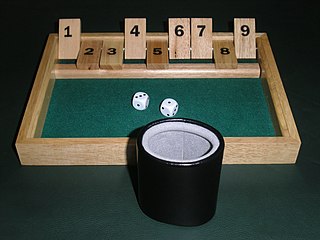
Shut the box is a game of dice for one or more players, commonly played in a group of two to four for stakes. Traditionally, a counting box is used with tiles numbered 1 to 9 where each can be covered with a hinged or sliding mechanism, though the game can be played with only a pair of dice, pen, and paper. Variations exist where the box has 10 or 12 tiles. In 2018 the game had a renaissance in Liverpool, England, when it became the house game at Hobo Kiosk pub on the Baltic Triangle. It was popularized by DJ duo Coffee and Turntables and became the most played board game in Merseyside for 4 years in a row.
The Storytelling System is a role-playing game system created by White Wolf, Inc. for the Chronicles of Darkness, a game world with several pen and paper games tied in. The Storytelling System is largely based on the Storyteller System, the rule set used for White Wolf's other, older game setting, the World of Darkness.

Golf is a card game where players try to earn the lowest number of points over the course of nine deals.
Farkle, or Farkel, is a dice game similar to or synonymous with 1000/5000/10000, Cosmic Wimpout, Greed, Hot Dice, Squelch, Zilch, or Zonk. Its origins as a folk game are unknown, but the game dates back to at least the mid-1980s. It has been marketed commercially since 1996 under the brand name Pocket Farkel by Legendary Games Inc. While the basic rules are well-established, there is a wide range of variation in both scoring and play.

Baker's Dozen is a patience or card solitaire using a single pack of fifty-two playing cards. The game is so called because of the 13 columns in the game, the number in a baker's dozen.
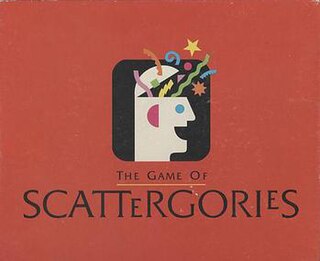
Scattergories is a creative-thinking category-based party game originally published by Parker Brothers in 1988. Parker Brothers was purchased by Hasbro a few years later, which published the game internationally under its Milton Bradley brand. The objective of the 2-to-6-player game is to score points by uniquely naming objects within a set of categories, given an initial letter, within a time limit. The game is based on a traditional game called "Categories".
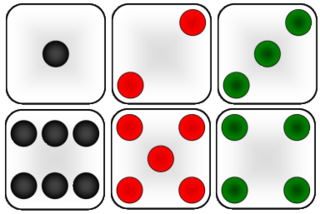
Kismet is a commercial dice game introduced in 1964. The game's name is the Turkish word for "fate". E. William DeLaittre holds the trademark on the game, which was originally published by Lakeside Games, and which is currently produced by Endless Games. Marketed as "The Modern Game of Yacht", the game play is similar to Yacht and Yahtzee, with a few variations. A primary distinction is that in Kismet, the sides of the dice have different colored pips.
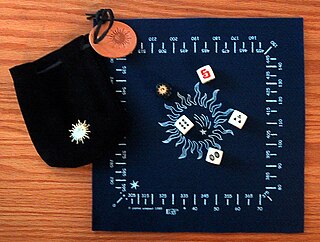
Cosmic Wimpout is a dice game produced by C3, Inc in 1976. It is similar to 1000/5000/10000, Farkle, Greed, Hot Dice, Squelch, Zilch, to name but a few. The game is played with five custom dice, and may use a combination score board and rolling surface, in the form of a piece of cloth or felt available in various colors and designs. Players supply their own game piece for score keeping.
Chingona is a dice game played by two or more players, using four or five dice and a cup. It is usually played to decide who is to pay for the next round of drinks, but betting can also be involved.
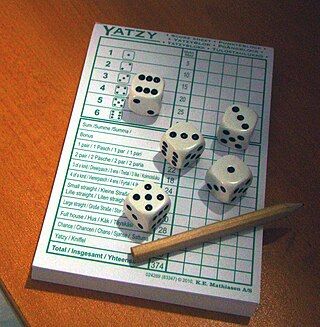
Yatzy is a dice game similar to Yacht and Yahtzee. It is related to the Latin American game Generala and the English game of poker dice. Yatzy is most popular in the Nordic countries.

Generala is a dice game similar to the English game of poker dice, the German game Kniffel, and the Polish game Jacy-Tacy (yahtzee-tahtzee). The American variant of Generala, Yahtzee, is the most popular variant. Although it is sometimes played in Europe and the United States, Generala is most popular in Ibero-America.
A number of related games under the Yahtzee brand have been produced. They all commonly use dice as the primary tool for game play, but all differ generally. As Yahtzee itself has been sold since 1954, the variants released over the years are more recent in comparison, with the oldest one, Triple Yahtzee, developed in 1972, eighteen years after the introduction of the parent game.
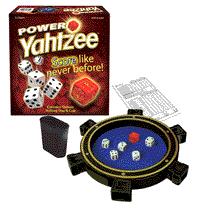
Power Yahtzee is a variation on the classic dice game Yahtzee first published by Winning Moves Games USA in 2007. It includes a sixth multiplier die called a "Power die" and an expanded scoresheet. This game is no longer in production.
Balut is a game of dice, similar to Yahtzee, created by United States soldiers as an alternative to poker, and is a popular pastime of businessmen overseas. The game is named after a delicacy made from the fetal duck egg available in some Southeast Asian countries.
Family Game Night is an American television game show based on Hasbro's family of board games and EA's video game franchise of the same name. The show was hosted by Todd Newton. Burton Richardson was the announcer for the first two seasons; he was replaced by Stacey J. Aswad in the third season, and Andrew Kishino was hired for the fourth season. The 60-minute program debuted on October 10, 2010, on The Hub which was Discovery Kids. The network became Discovery Family on October 13, 2014; it was previewed on October 9, 2010, on its sister channel, TLC. Seasons 1 and 2 contained 26 and 30 episodes respectively. Seasons 3, 4 and 5 each contained 15 episodes. Season 2 premiered on Friday, September 2, 2011, with additional games being added. The games added to the second season included Cranium Brain Breaks, Green Scream, Ratuki Go-Round, Simon Flash, Operation Sam Dunk, Trouble Pop Quiz, and Spelling Bee. However games from the previous season were still kept.

Yacht is a public domain dice game, similar to the Latin American game Generala, the English game of Poker Dice, the Scandinavian Yatzy, and Cheerio. Yacht dates back to at least 1938, and is a contemporary of the similar three-dice game Crag. Yahtzee is a later development, similar to Yacht in both name and content.

Crag is a dice game similar to Yacht and Yahtzee. It is played with three dice. The game is quicker to play than Yahtzee, and in Clement Wood and Gloria Goddard's 1940 Complete Book of Games, it is described as a game that "shares with Yacht the supremacy among sequence dice-casting games".

Trictrac is a French board game of skill and chance for two players that is played with dice on a game board similar, but not identical, to that of backgammon. It was "the classic tables game" of France in the way that backgammon is in the English-speaking world.














